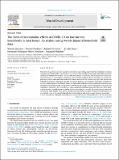The Short-Term Economic Effects of Covid-19 on Low-income Households in Rural Kenya: An Analysis Using Weekly Financial Household Data
Publication Date
2020-11-25Type
Article, Journalviews
downloads
Metadata
Show full item recordCitation
Wendy Janssens, Menno Pradhan, Richard de Groot, Estelle Sidze, Hermann Pythagore Pierre Donfouet, Amanuel Abajobir, The short-term economic effects of COVID-19 on low-income households in rural Kenya: An analysis using weekly financial household data, World Development, Volume 138, 2021, 105280, ISSN 0305-750X, https://doi.org/10.1016/j.worlddev.2020.105280.
Abstract/
This research assesses how low-income households in rural Kenya coped with the immediate economic consequences of the COVID-19 pandemic. It uses granular financial data from weekly household interviews covering six weeks before the first casewas detected in Kenya to five weeks after during which various containment measureswere implemented. Based on household-level fixed-effects regressions, our results suggest that income from work decreased with almost one-third and income from gifts and remittances reduced by more than one-third after the start of the pandemic. Nevertheless, household expenditures on food remained at pre-COVID levels.Wedo not find evidence that households coped with reduced income through increased borrowing, selling assets or withdrawing savings. Instead, they gave out less gifts and remittances themselves, lent less money to others and postponed loan repayments. Moreover, they significantly reduced expenditures on schooling and transportation, in line with the school closures and travel restrictions. Thus, despite their affected livelihoods, households managed to keep food expenditures at par, but this came at the cost of reduced informal risk-sharing and social support between households.
Subject/
COVID-19 pandemic; Economic effects; Fixed-effects regressions; Risk-coping; East Africa; Kenya
Further Details
This is an open access article under the CC BY-NC-NDlicense (http://creativecommons.org/licenses/by-nc-nd/4.0/).
Publisher
ElsevierISSN
0305-750XCollections
- General - GEN [367]

